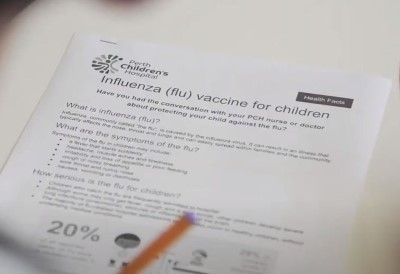Search
Research
The impact of Influenza infection during early life on immune developmentThis study will investigate the why disease is worse in infants and how early life viral infection impacts the developing immune system.

News & Events
Flu jab for school kids best defence from virus, experts sayUp to 40,000 influenza cases could be prevented in Western Australia this winter if more primary school-aged children were vaccinated, researchers at The Kids Research Institute Australia have found.

News & Events
RSV and influenza detections hit record low levels in 2020Western Australia has experienced historically low levels of respiratory syncytial virus (RSV) and influenza this winter due to the public health measures implemented to prevent the spread of COVID-19.
Research
Effectiveness of trivalent flu vaccine in healthy young childrenThis paper reports some of the findings from the Western Australian Influenza Vaccine Effectiveness Study, commenced in 2008, to evaluate a program providing...
Research
Virus detection and its association with symptoms during influenza-like illness in a sample of healthy adults enrolled in a randomised controlled vaccine trialViral respiratory infections are associated with significant morbidity and mortality.
Research
No role for neutrophil elastase in influenza-induced cellular recruitment, cytokine production or airway hyperresponsiveness in micePrevious studies have suggested that in vitro modulation of neutrophil chemokines and inflammatory cytokines by neutrophil elastase (NE) does not translate to t
Research
How immunity shapes the long-term dynamics of influenza H3N2Since its emergence in 1968, influenza A H3N2 has caused yearly epidemics in temperate regions. While infection confers immunity against antigenically similar strains, new antigenically distinct strains that evade existing immunity regularly emerge ('antigenic drift'). Immunity at the individual level is complex, depending on an individual's lifetime infection history.
Research
Haemophilus influenzae remains the predominant otitis media pathogen in Australian children undergoing ventilation tube insertion in the PCV13 eraUnderstanding patterns of bacterial carriage and otitis media (OM) microbiology is crucial for assessing vaccine impact and informing policy. The microbiology of OM can vary with geography, time, and interventions like pneumococcal conjugate vaccines (PCVs). We evaluated the microbiology of nasopharyngeal and middle ear effusions in children living in Western Australia, 11 years following the introduction of PCV13.
Research
Effectiveness of 2023 southern hemisphere influenza vaccines against severe influenza-associated illness: pooled estimates from eight countries using the test-negative designAnnual estimates of seasonal influenza vaccine effectiveness can guide global risk communication and vaccination strategies to mitigate influenza-associated illness. We aimed to evaluate vaccine effectiveness in countries using the 2023 southern hemisphere influenza vaccine formulation.
Research
Widening the lens for pandemic preparedness: children must be seen and heardThe Australian and New Zealand Paediatric Infectious Diseases (ANZPID) Group of the Australasian Society for Infectious Diseases (ASID) calls for urgent consideration of the needs and voices of children in response to the COVID-19 pandemic, and in planning for future pandemics.
